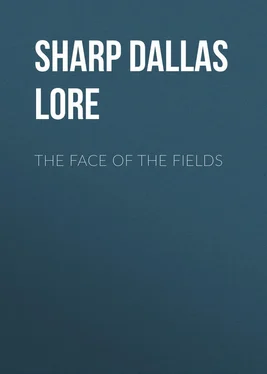Dallas Sharp - The Face of the Fields
Здесь есть возможность читать онлайн «Dallas Sharp - The Face of the Fields» — ознакомительный отрывок электронной книги совершенно бесплатно, а после прочтения отрывка купить полную версию. В некоторых случаях можно слушать аудио, скачать через торрент в формате fb2 и присутствует краткое содержание. Жанр: Природа и животные, foreign_antique, foreign_prose, на английском языке. Описание произведения, (предисловие) а так же отзывы посетителей доступны на портале библиотеки ЛибКат.
- Название:The Face of the Fields
- Автор:
- Жанр:
- Год:неизвестен
- ISBN:нет данных
- Рейтинг книги:5 / 5. Голосов: 1
-
Избранное:Добавить в избранное
- Отзывы:
-
Ваша оценка:
- 100
- 1
- 2
- 3
- 4
- 5
The Face of the Fields: краткое содержание, описание и аннотация
Предлагаем к чтению аннотацию, описание, краткое содержание или предисловие (зависит от того, что написал сам автор книги «The Face of the Fields»). Если вы не нашли необходимую информацию о книге — напишите в комментариях, мы постараемся отыскать её.
The Face of the Fields — читать онлайн ознакомительный отрывок
Ниже представлен текст книги, разбитый по страницам. Система сохранения места последней прочитанной страницы, позволяет с удобством читать онлайн бесплатно книгу «The Face of the Fields», без необходимости каждый раз заново искать на чём Вы остановились. Поставьте закладку, и сможете в любой момент перейти на страницу, на которой закончили чтение.
Интервал:
Закладка:
“We swung out past the Blue Hills, and yonder flashed the morning sun from the towering dome of the State House. I might have leaped from the cab and run the rest of the way on foot, had I not caught the eye of the engineer watching me narrowly. I was not in Boston yet, nor in Cambridge either. I was an escaped lunatic, who had held up a train, and forced it to carry me to Boston.
“Perhaps I had overdone the lunacy business. Suppose these two men should take it into their heads to turn me over to the police, whether I would or no? I could never explain the case in time to get the eggs to Agassiz. I looked at my watch. There were still a few minutes left, in which I might explain to these men, who, all at once, had become my captors. But it was too late. Nothing could avail against my actions, my appearance, and my little pail of sand.
“I had not thought of my appearance before. Here I was, face and clothes caked with yellow mud, my hair wild and matted, my hat gone, and in my full-grown hands a tiny tin pail of sand, as if I had been digging all night with a tiny tin shovel on the shore! And thus to appear in the decent streets of Boston of a Sunday morning!
“I began to feel like a lunatic. The situation was serious, or might be, and rather desperately funny at its best. I must in some way have shown my new fears, for both men watched me more sharply.
“Suddenly, as we were nearing the outer freight-yard, the train slowed down and came to a stop. I was ready to jump, but I had no chance. They had nothing to do, apparently, but to guard me. I looked at my watch again. What time we had made! It was only six o’clock, with a whole hour to get to Cambridge.
“But I didn’t like this delay. Five minutes – ten – went by.
“‘Gentlemen,’ I began, but was cut short by an express train coming past. We were moving again, on – into a siding; on – on to the main track; and on with a bump and a crash and a succession of crashes, running the length of the train; on at a turtle’s pace, but on, – when the fireman, quickly jumping for the bell-rope, left the way to the step free, and – the chance had come!
“I never touched the step, but landed in the soft sand at the side of the track, and made a line for the yard fence.
“There was no hue or cry. I glanced over my shoulder to see if they were after me. Evidently their hands were full, and they didn’t know I had gone.
“But I had gone; and was ready to drop over the high board-fence, when it occurred to me that I might drop into a policeman’s arms. Hanging my pail in a splint on top of a post, I peered cautiously over – a very wise thing to do before you jump a high board-fence. There, crossing the open square toward the station, was a big burly fellow with a club – looking for me.
“I flattened for a moment, when some one in the yard yelled at me. I preferred the policeman, and grabbing my pail I slid over to the street. The policeman moved on past the corner of the station out of sight. The square was free, and yonder stood a cab!
“Time was flying now. Here was the last lap. The cabman saw me coming, and squared away. I waved a paper dollar at him, but he only stared the more. A dollar can cover a good deal, but I was too much for one dollar. I pulled out another, thrust them both at him, and dodged into the cab, calling, ‘Cambridge!’
“He would have taken me straight to the police station, had I not said, ‘Harvard College. Professor Agassiz’s house! I’ve got eggs for Agassiz’; and pushed another dollar up at him through the hole.
“It was nearly half-past six.
“‘Let him go!’ I ordered. ‘Here’s another dollar if you make Agassiz’s house in twenty minutes. Let him out. Never mind the police!’
“He evidently knew the police, or there were few around at that time on a Sunday morning. We went down the sleeping streets, as I had gone down the wood-roads from the pond two hours before, but with the rattle and crash now of a fire brigade. Whirling a corner into Cambridge Street, we took the bridge at a gallop, the driver shouting out something in Hibernian to a pair of waving arms and a belt and brass buttons.
“Across the bridge with a rattle and jolt that put the eggs in jeopardy, and on over the cobble-stones, we went. Half-standing, to lessen the jar, I held the pail in one hand and held myself in the other, not daring to let go even to look at my watch.
“But I was afraid to look at the watch. I was afraid to see how near to seven o’clock it might be. The sweat was dropping from my nose, so close was I running to the limit of my time.
“Suddenly there was a lurch, and I dove forward, ramming my head into the front of the cab, coming up with a rebound that landed me across the small of my back on the seat, and sent half of my pail of eggs helter-skelter over the floor.
“We had stopped. Here was Agassiz’s house; and not taking time to pick up the scattered eggs, I tumbled out, and pounded at the door.
“No one was astir in the house. But I would stir them. And I did. Right in the midst of the racket the door opened. It was the maid.
“‘Agassiz,’ I gasped, ‘I want Professor Agassiz, quick!’ And I pushed by her into the hall.
“‘Go ’way, sir. I’ll call the police. Professor Agassiz is in bed. Go ’way, sir.’
“‘Call him – Agassiz – instantly, or I’ll call him myself!’
“But I didn’t; for just then a door overhead was flung open, a white-robed figure appeared on the dim landing above, and a quick loud voice called excitedly, —
“‘Let him in! Let him in! I know him. He has my turtle eggs!’
“And the apparition, slipperless, and clad in anything but an academic gown, came sailing down the stairs.
“The maid fled. The great man, his arms extended, laid hold of me with both hands, and dragging me and my precious pail into his study, with a swift, clean stroke laid open one of the eggs, as the watch in my trembling hands ticked its way to seven – as if nothing unusual were happening to the history of the world.”
“You were in time then?” I said.
“To the tick. There stands my copy of the great book. I am proud of the humble part I had in it.”
III
THE EDGE OF NIGHT
BEYONDthe meadow, nearly half a mile away, yet in sight from my window, stands an apple tree, the last of an ancient line that once marked the boundary between the upper and lower pastures. For an apple tree it is unspeakably woeful, and bent, and hoary, and grizzled, with suckers from feet to crown. Unkempt and unesteemed, it attracts only the cattle for its shade, and gives to them alone its gnarly, bitter fruit.
But that old tree is hollow, trunk and limb; and if its apples are of Sodom, there is still no tree in the Garden of the Hesperides, none even in my own private Eden, carefully kept as they are, that is half as interesting – I had almost said, as useful. Among the trees of the Lord, an apple tree that bears good Baldwins or greenings or rambos comes first for usefulness; but when one has thirty-five of such trees, which the town has compelled one to trim and scrape and plaster-up and petticoat against the grewsome gypsy moth, then those thirty-five are dull indeed, compared with the untrimmed, unscraped, unplastered, undressed old tramp yonder on the knoll, whose heart is still wide open to the birds and beasts – to every small traveler passing by who needs, perforce, a home, a hiding, or a harbor.
When I was a small boy everybody used to put up overnight at grandfather’s – for grandmother’s wit and buckwheat cakes, I think, which were known away down into Cape May County. It was so, too, with grandfather’s wisdom and brooms. The old house sat in behind a grove of pin-oak and pine, a sheltered, sheltering spot, with a peddler’s stall in the barn, a peddler’s place at the table, a peddler’s bed in the herby garret, a boundless, fathomless feather-bed, of a piece with the house and the hospitality. There were larger houses and newer, in the neighborhood; but no other house in all the region, not even the tavern, two miles farther down the Pike, was half as central, or as homelike, or as full of sweet and juicy gossip.
Читать дальшеИнтервал:
Закладка:
Похожие книги на «The Face of the Fields»
Представляем Вашему вниманию похожие книги на «The Face of the Fields» списком для выбора. Мы отобрали схожую по названию и смыслу литературу в надежде предоставить читателям больше вариантов отыскать новые, интересные, ещё непрочитанные произведения.
Обсуждение, отзывы о книге «The Face of the Fields» и просто собственные мнения читателей. Оставьте ваши комментарии, напишите, что Вы думаете о произведении, его смысле или главных героях. Укажите что конкретно понравилось, а что нет, и почему Вы так считаете.












